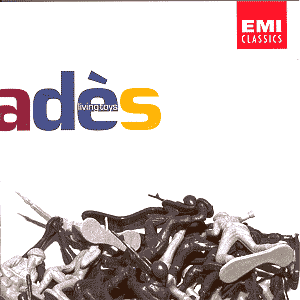The exuberance of imagination (and fiendishly difficult
writing) noted on the disc, ‘Life Story,’
CDZ5 69699-2 is continued on the present offering. The five pieces make
for a well-contrasted programme presented by some of the finest artists
active in the UK at the moment.
Appropriately, Living Toys is performed by the
London Sinfonietta, a group that positively thrives on challenge. It
was written in 1993 for this very group. The idea that generated it
came from an anonymous Spanish source, which talks of a child’s dreams,
and how these dreams make the adults who hear them realise ‘that their
lives were less substantial than the dreams that surrounded [the child]
like toys’. Adès takes the listener to a charged, somewhat dark
place with his music, characteristic registral extremes vying with sonorities
almost beyond the reach of the forces employed.
Arcadiana, (Adès’ first string quartet)
provides the perfect textural contrast. It was written in 1994 for the
Endellion String Quartet, who perform it here. It has a wide, almost
virtuoso, frame of reference, taking in Papageno’s silver bells, the
figuration of Schubert’s ‘Auf dem Wasser zu singen’ and a homage to
‘Nimrod’ in tender, Elgarian delicacy. The final, still evocation of
‘Lethe’ is an effective, emotive way to close the piece.
Adès has stated that, ‘My ideal day would be
staying at home and playing the harpsichord works of Couperin – new
inspiration on every page’. Perhaps that is what Adès aspires
to himself, and the result, Sonata da caccia (1994), is a fascinating
take on older forms. The first movement, ‘Gravement’, is disembodied,
like a modern ghost. There are many moments that may easily be described
as ‘sweet’, not a word often used in reference to Adès and a
reflection of the affectionate nature of this tribute. The performance
is superb. Perhaps, if forced to select one of the musicians for special
praise, it would be Michael Niesemann’s superbly articulated baroque
oboe. It makes the perfect foil to The Origin of the Harp (1994),
a dark, dramatic chamber tone-poem for trios of clarinets, violas and
cellos with percussion.
Gefriolsae Me, which closes the disc, is a slow-moving
anthem written for King’s College Choir in 1990. It takes its text from
Psalm 51 (‘Deliver me from bloodguiltiness, o God, thou God of my salvation’).
It is predominantly dark and makes a haunting, doubting conclusion to
a thought-provoking disc. Adès’ music repays repeated listening,
and performances like this give one the perfect opportunity to give
this music the consideration it is due.
Colin Clarke

![]() cMichael Niesseman
(baroque oboe); cAndrew Clark (horn); bEndellion
String Quartet; eChoir of King’s College, Cambridge/Stephen
Cleobury; dinstrumental ensemble/ Thomas Adès (piano/charpsichord);
aLondon Sinfonietta/Marcus Stenz.
cMichael Niesseman
(baroque oboe); cAndrew Clark (horn); bEndellion
String Quartet; eChoir of King’s College, Cambridge/Stephen
Cleobury; dinstrumental ensemble/ Thomas Adès (piano/charpsichord);
aLondon Sinfonietta/Marcus Stenz.![]() EMI CDZ5
72271-2 [64.21]
EMI CDZ5
72271-2 [64.21]